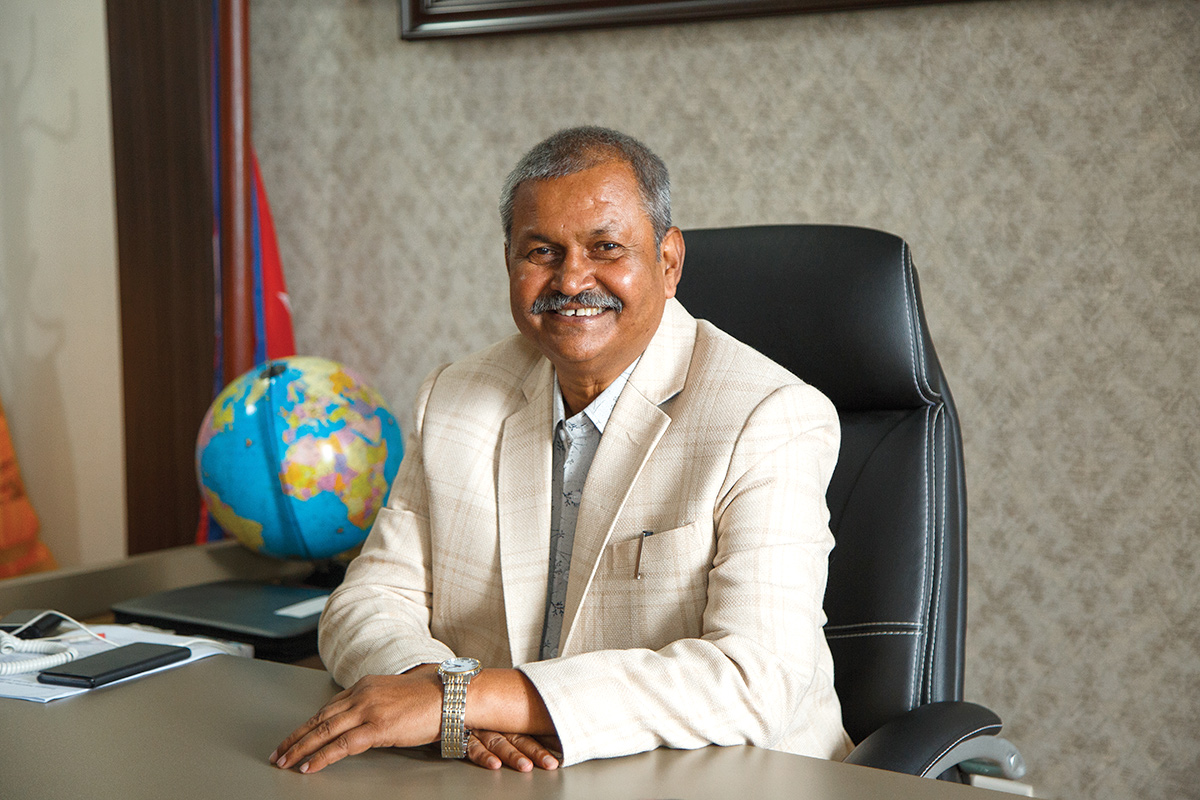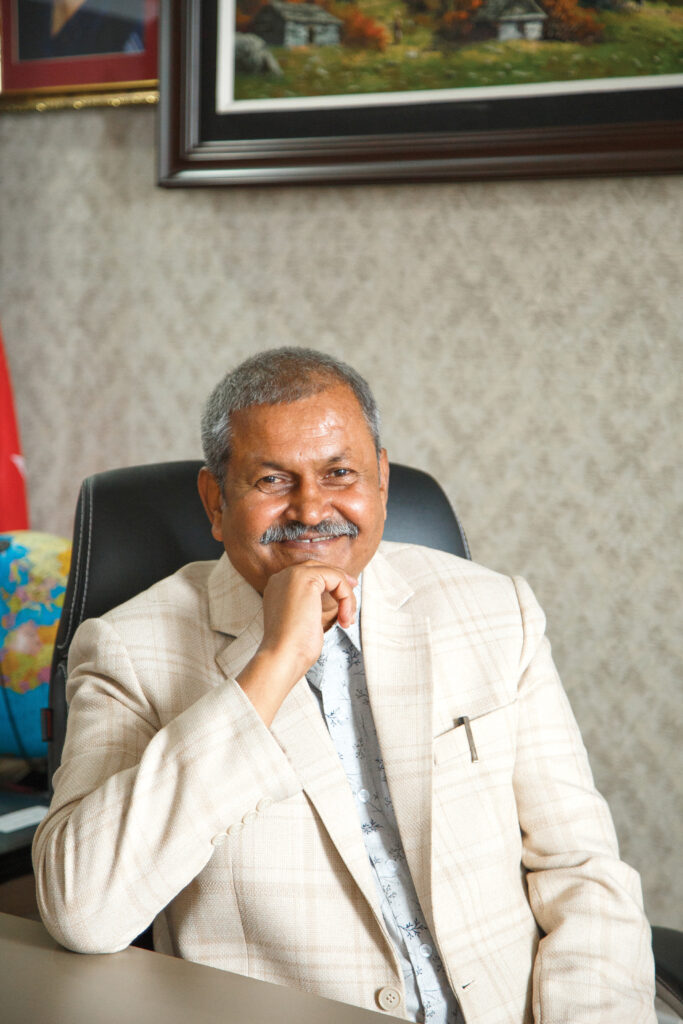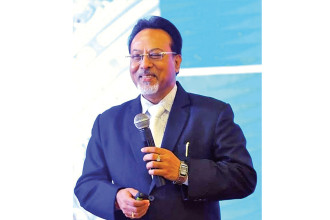
Rameshwar Ray Yadav is the Minister for Labour, Employment and Social Security of Nepal and represents electoral constituency 3 of Sarlahi district in the lower House of Representatives. He has a Masters degree in Political Science. He is the Central Committee Member of the ruling Nepal Communist Party.He was appointed as the Minister for Labour, Employment and Social Security in November 2019. Yadav aims to make the labour market safe, secured and dignified inside and outside of country. Under his leadership, the Ministry has initiated employment based policy measures to keep the adverse situation created by COVID 19 on track and also to prevent from further worsening. Yadav is widely recognised as an accademician and for his indepth knowledge of law.
In an interview with Dibesh Dangol from B360, Rameshwar Ray Yadav talks on the several issues of the current situations like the Ministry tackling with the COVID 19 pandemic, creating jobs, situation of Nepali migrant workers and their repatriation. Excerpts:

What are the main issues the Ministry is tackling in face of the COVID 19 pandemic?
Due to the current pandemic situation, many Nepalis have lost their jobs both domestically and internationally. Our main agendas right now are to create employment opportunities in Nepal, bring our economy back to normal state and even increase it, and help migrant workers who are stranded in foreign countries. We are constantly communicating with our embassies abroad mainly in the Persian Gulf region and East Asian countries to know the state of Nepali migrant workers in those regions and countries. We are continuously helping them by providing reliefs such as shelter and conducting repatriation flights if they want to come back to Nepal. Besides, we are working on skill development training so that our domestic manpower will be equipped with all the necessary skills and knowledge to search their jobs themselves in the labour markets. It is also supposed to help them search better job opportunity. This is not just the agenda set by our ministy but also by the Government of Nepal. We are coordinating with the World Bank and various line ministries in this regards. We are planning to create better job opportunities in the country. We are also working on establishing Labour Force Information Bank to collect the data of unemployed citizens and provide employment opportunities to them based on their competencies. This Bank will have information about the number of skilled, semi-skilled and non-skilled workers inside the country, and skilled and non-skilled Nepali migrant workers who have departed to or returned from abroad. It will establish linkage between job seekers and job providers. A separate internal employment division will be established in the ministry to deal with these issues.The government announced plans to create 700,000 jobs in the fiscal year 2020-2021 in different sectors but a task force formed to study the impact of COVID 19 has said that the country needs to create 1.5 million jobs. How is your ministry working with other ministries to meet this goal?
Since the name of our ministry is the Ministry of Labour, Foreign Employment and Social Security, it is our prime responsibility to oversee the management of labour, search and create job opportunities, and bind people in the social security scheme. Our main objective right now is to help the workers and employers of various sectors that have been drastically affected by the COVID 19 pandemic. We are collaborating with the concerned ministries and private sectors in this regards. The ministries themselves have collected the data and works are being done to revive the sectors and economy of Nepal. Private sector’s demand, opportunities, investment, portfolios and skills matching are also being prioritised. We have also planned to create labour permits for domestic workers. People will need to take the permit to work in Nepal or go abroad as migrant workers. People without permit won’t be allowed to work domestically. This will create ease in management of labour and data collection. We are also working on establishing multi-purpose standard skill training centres in all provinces. The centres will train people to gain the required skulls and after testing their skills, authentic certificates will be provided to them. This will decrease the umemployment ratio and also contribute to reduce the number of causalities in terms of workplace accidents and getting into legal troubles because of not knowing the rules and regulations of the country. It is possible to create 1.5 million jobs within this fiscal year. As per the data collected by our ministry with the collaboration of other ministries and the private sectors, there is a possibility to create 2-2.5 million jobs in Nepal. But our main goal right now is to create skilled Nepalis so that we can fulfil the slogan ‘Prosperous Nepal, Happy Nepalis’ put forward by PM Oli. We are primarily focusing and targeting on creating jobs inside the country. In the matter of foreign employment, we want to send skilled migrant workers to new destinations – mainly European countries – where the Nepalis migrant workers can earn attractive remunerations and facilities.
Till now about 12,500 companies and 160,000 people have been registered under the social security scheme and Rs 1.65 billion has been collected in the fund. We are also planning to provide house and education loan facilities to employees who are the contributors to the fund. There is no alternative of contributory social security fund globally, therefore, I request all concerned to enrol here.
Remittance contributes to more than 25% of the national GDP but the inflow has drastically reduced due to the pandemic; is the ministry concerned?
Remittance is important for our country’s economy and now concerns have been raised on the possibility of a drastic decrease in the flow of remittance due to the pandemic. Yes, people are rethinking about going abroad to work due to the fear of the pandemic and job security. Many migrant workers have also returned to Nepal due to the same reasons. But I don’t think that the remittance flow will decrease drastically because there are a huge number of people who are desperately waiting for the travel ban to lift so that they can go for foreign employment. We are mainly focusing on finding new, high paying and secure destinations like Japan, South Korea and European countries for our migrant workers. Though the number of migrant workers sending to these countries comparatively will be less in numbers, the remittance will be increased due to the high wages or salary. It depends upon the effect of the Coronavirus in the global society. I hope the vaccine for the virus will be discovered soon and the economic activities will be resumed in full-fledged. Therefore, Nepal needs to develop the internal and external employment strategy accordingly.Migrant workers have been raising their voice against mistreatment by the government and embassies for not being helpful at this time, especially on repatriation issues. How is the Ministry resolving this?
Such unexpected situations occurred in the initial two weeks of global lockdown announcement due to the sudden fear of the coronavirus. All of a sudden countries closed down their airports and declared a global travel ban due to which we couldn’t immediately bring our citizens back to Nepal. In spite of the global travel ban, all of us tried our best to provide shelter and other necessities to stranded Nepalis. The frequent communications between presidents, prime ministers, foreign affair ministers, embassies and other ministers with respective counterparts of various countries helped to response the sitiation easi. Immediately, our Ministry also reallocated and transferred emergency funds from the Foreign Employment Promotion Board to the embassies to help troubled Nepalis. The fund helped to provide immediate support for necessary shelter and food to them. After the Supreme Court issued an order to repatriate Nepali workers using Foreign Employment Welfare Fund, we prepared a procedure which has already been approved by the cabinet. Currently, the process of repatriation of Nepali migrant workers is going on. We are providing psycho-social assistance to the returnee migrant workers regarding how to get back to the community. Society should not discriminate with them. We are providing financial assistance as a relief of Rs 50,000 to families whose loved ones have died in abroad and those who can’t afford to bring the dead body back to Nepal and have agreed for the cremation in abroad. We hope this will be an immediate relief to the affected family. I don’t think problems and issues which occurred in the initial few weeks of global lockdown are there anymore.What about women migrant worker issues?
Dignified, secured and well managed working environment is the main concern when it comes to woman migrant workers. We want our woman migrant workers to be safe when they go to other countries. In the repatriation flights we conducted during this pandemic, many of them were women and few of them came back with serious social stigma. These social problems being faced by the female migrant workers need to be solved at earliest. We have been continuously working on it by spreading social awareness campaigns and social counselling in rural areas, discouraging women to go for foreign employment through illegal channels and have been coordinating and informing our embassies to provide secured environment to woman migrant workers. But, some of the things aren’t in our hands. The female migrant workers themselves need to understand these things seriously. The Government and the Parliament are serious in order to address the issues.What about repatriating undocumented migrant workers?
Though we want to help them because they are our brothers and sisters, it is critical issue. They should not use illegal channels. They should go with labour permits and should join the government Foreign Employment Welfare Fund. These would insure the security in Foreign Employment. Putting one’s own life in multiple hazards and threats shall be reduced by providing country based information to the aspirant migrants.The government publicised the Social Security Scheme but it hasn’t resulted in anything till now. Where does the Social Security Scheme stand?
Social Security Scheme is a national campaign initiated by the government for the benefit of all types of workers, whether it is in government or private offices. The formal sectors workers have been benefiting from the provident fund. Such scheme includes medical, health, maternity, and accidental, and disability, dependent family and old-age benefits. But the people working in private sectors were deprived of such benefits which raised questions regarding their job, health and life security. Now through social security scheme, the people working in private sectors can also get such benefits; can have long term life and family security. Till now about 12,500 companies and 160,000 people have been registered under the scheme and Rs 1.65 billion has been collected in the fund. We are also planning to provide house and education loan facilities to employees who are the contributors to the fund. There is no alternative of contributory social security fund globally, therefore, I request all concerned to enrol here. In lack of appropriate information, beforehand, it was not taken speed, but now the number of participants – both employers and employees – is rising substantially. Eventually, we want to have the access to farmers in this scheme because about 50 per cent of the total population of Nepal is involved in agriculture field. In this way, majority of populations can benefit from the scheme.
Published Date: August 11, 2020, 12:00 am
Post Comment
E-Magazine
RELATED Face 2 Face





